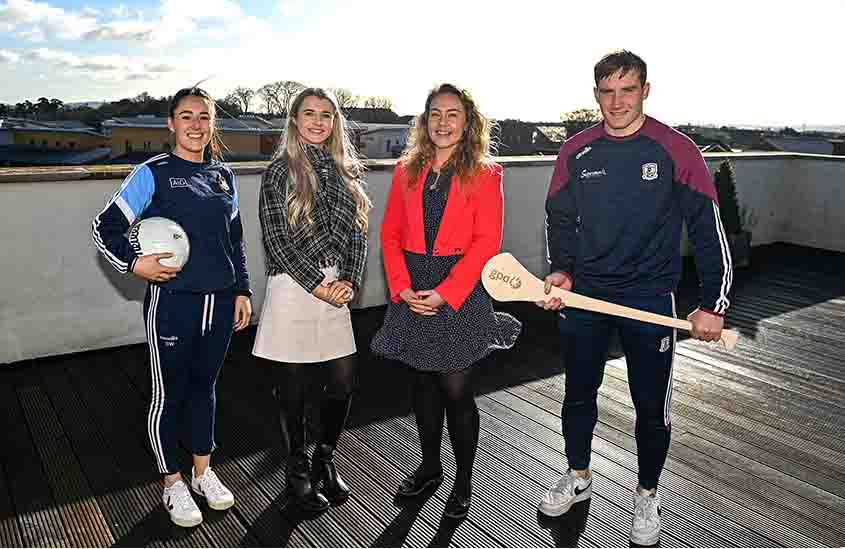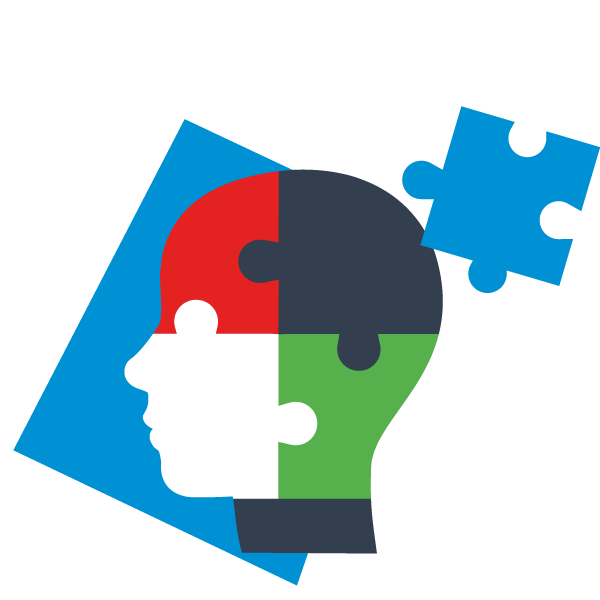News

Examining the Impact of Seasonal Changes in Gaelic Player’s Thinking Styles and Identity on Wellbeing
The Gaelic Players Association has teamed up with researchers from Loughborough University to explore the role thinking styles and identity can have on inter-county players’ well-being over a competitive season.
Ailish King, a PhD student in the School of Sport, Exercise and Health Sciences at Loughborough University, will act as the Main Investigator for the research along with her research team of Dr Jamie Barker, Dr Carolyn Plateau and Dr Martin Turner. She was in Dublin today alongside Dublin footballer Siobhán Woods and Galway hurler Conor Whelan to kick off the data gathering phase of the study.
By carrying out this research, the investigators hope to gain further understanding of how player’s thinking styles may contribute to well-being over time. The relationship between wellbeing and social identity will also be explored.
We spoke to Ailish at the launch.
GPA: So first of all, you might just give us a synopsis of what is involved in this research; what’s the purpose and what’s the aim?
AK: So, this research is looking at thinking styles in inter-county GAA players across the board, both male and female players. When I talk about thinking styles, it’s kind of these rigid expectations that athletes place on themselves to perform. So, it could sound along the lines of I must win and if I don’t, I’m a failure as a person. They place these kinds of expectations on themselves due to that pressure to perform, the pressure to win, to be selected or to get over injury. Then we’re also looking at how these thinking styles impact wellbeing and impact certain behaviours, and also various buffers to this. So, for example, identity; having a strong identity to the team and to the wider community, could that act as a buffer against these thinking styles and potential wellbeing outcomes? What we’re getting out of the research is an understanding of the mental health and wellbeing issues that exist in both male and female players, why it exists, and then those buffers, that hopefully, we can look at strengthening.
GPA: Over the course of a season like we have in Gaelic games which starts in February and, in some cases for successful teams, runs all the way through to the end of July, as it is now; I assume the thinking style possibly changes because at the start of the year, the aim might be to stay in Division One of the league and not get relegated, whereas toward the tail end of the year, it might be now we’re in a final let’s win this; can we assume all of those have an impact then on the thinking style?
AK: You know, the research is looking over a competitive season. So, it is hopefully going to capture all of that data and hopefully identify those pinch point areas where actually we do need to intervene and support athletes more at those various points. And it’s not just the sporting pressures that exist within that competitive season. It’s the things that they might be going through in their personal life as well. So, whether that’s to do with work, there’s family issues, they might be going through bereavement. So, hopefully it is just being able to identify when those thinking styles might peak and when mental health issues might become more apparent, or on the flip side, when we might have positive wellbeing as well.
GPA: This is the first time that this kind of research has been done within Gaelic game but has similar research been carried out in other sporting organisations or other sports.
AK: There’s actually been a study that has looked at these thinking styles and linked this to burnout in Gaelic players. This was in an adolescent male athlete. So already there is some appreciation and some understanding that these thinking styles do link to something like burnout. In the wider sporting world, thinking styles have been linked to various mental health and wellbeing outcomes, across various sports, Olympic sports and football and various other ones as well.
GPA: When you’re starting out in a research project like this, do you have expectations? Or do you have to set any expectations aside? Because all of the outcomes are obviously going to be based on the data?
AK: You’re always I guess, trying to be evidence based. So, while you think that you know, you have hypotheses and you think that these thinking styles will be linked to mental health and wellbeing outcomes, it’s all data driven and research led. So, depending on what we find in terms of what thinking styles are linked to these mental health outcomes, that will then inform future work that we do, future research, future support packages and interventions that we start to look at and build on.
GPA: And would you expect to see differences? For example, and you mentioned the fact that this is covering both male and female athletes, would you expect to see differences between the genders in terms of the thinking styles at different stages of the of the season?
AK: I think so. I think when we think of mental health disorders, there are gender differences across them. So, I think it’s really important that we actually get this data on both male and female players rather than just borrowing the resources from what we know about male athletes. It’s about making sure that what we are offering is gender specific, and that we can help support the female athlete maximise their potential to the same level that we are able to do for male athletes given that we have a lot of that research on males already available.
GPA: You can’t predict outcomes, but what are the outputs?
We’re looking at a range of mental health and wellbeing outcomes. So, things like burnout, compulsive training, disordered eating, depression, anxiety, coping styles and a whole host of other those outcomes. So hopefully identifying if it exists within this population for both the male and female player, we’re also hoping to identify those buffers. Thinking about if identity is something that we can strengthen or the social support that’s available. So, it’s about identifying the buffers and then the final piece as well will just be about potentially intervening on these. That will come later on down the line, once we’ve got the data, can we manage and discourage the formation of these unhelpful thinking styles to bring about some positive wellbeing outcomes?
GPA: It will be a long slog for you over the course of the next number of months but what’s the deadline that you’ve set yourself?
AK: We’re going to start almost immediately so early in the season hoping to capture as much data as we can now. And then we’ll go mid-season. So, looking at kind of May-ish time, and then we’re going end of season. We’ll then have three time points to hopefully capture some of those peaks and troughs in terms of demands and expectations. And then following on from this, we should be able to follow the players over the course of those three time points and from this, analyse the data and then produce some outputs and develop our knowledge to inform the development of supports.
Research Study Further Information
Research Team:
Main Investigator:
Ailish King, School of Sport, Exercise and Health Sciences, Loughborough University, Loughborough
Supervisors:
Dr Jamie Barker, School of Sport, Exercise and Health Sciences, Loughborough University
Dr Carolyn Plateau, School of Sport, Exercise and Health Sciences, Loughborough University
Dr Martin Turner, Faculty of Health, Psychology and Social Care, Manchester Metropolitan University
GPA Point of Contact:
Jennifer Rogers, Player Development Manager, Gaelic Players Association
What is the purpose of the study?
The purpose of this study is to explore the role thinking styles can have on inter-county GAA player’s well-being over a competitive season. The measures for this study will include training and eating behaviours, well-being, coping methods, how a player feels about their sport, thinking styles, social support, personal sport standards, team relatedness and athletic identity. By carrying out this research, the investigators hope to gain further understanding of how player’s thinking styles may contribute to well-being over time. The relationship between wellbeing and social identity will also be explored.
Who is doing this research and why?
This study is being conducted by Ailish King, a PhD Student from the School of Sport, Exercise and Health Sciences. Her research is supervised by Dr Jamie Barker, Dr Carolyn Plateau and Dr Martin Turner. The study is part of a student research project which will form part of a PhD thesis.
What does participation involve?
GPA members will be invited to complete a questionnaire at three time points spanning approximately a 9-month period: 1) start of season, 2) mid- season and, 3) end of the season. Broadly, the questionnaire is about thinking styles and wellbeing in sport which will include questions regarding their beliefs, training and eating behaviours, well-being, how they feel about their sport, thinking styles, coping methods, social support, the standards they set for themselves in their sport, team relatedness and athletic identity. The questionnaire will also ascertain their experiences of COVID-19. As part of the first questionnaire only, they will be asked to provide personal information (age, gender and ethnicity) and information regarding their sport involvement. They will also be asked to generate a unique code to enable the questionnaires over the three time points to be matched.
At the end of the questionnaire, information about relevant support services will be provided. At each time point following the completion of the questionnaire, they will be invited to enter a prize draw as reimbursement for their time. They will have the opportunity to win one of four Amazon vouchers worth £100 at each of the prize draws. They do not have to enter the prize draw if they do not want to.
How will the anonymised data/results collected from me be used?
Anonymised data will be collated and analysed. The data collected will form part of a PhD thesis and has the potential to be published within an academic journal. Individual responses will not be identifiable in either of these reports. The GPA will also receive a report of the general, anonymised, non-identifiable findings.
Data collection is due to commence before the end of February 2022.
Questions?
If any further information is required, please contact Jennifer Rogers, jennifer@gaelicplayers.com













